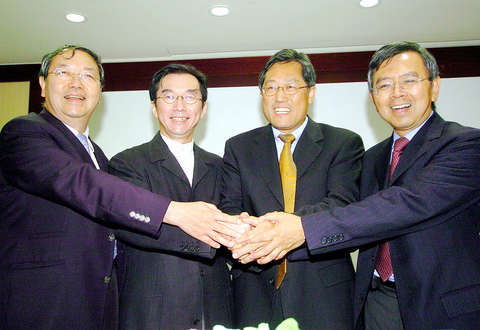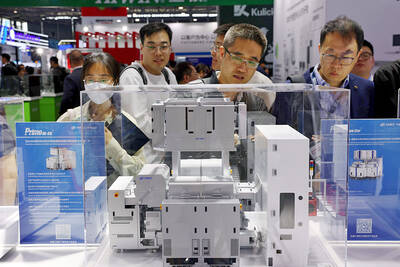Faced with shrinking margins in the computer business, Quanta Computer
The company announced last month that it was setting up a liquid-crystal display (LCD) television venture with Japan's Sanyo Electric Co, and said earlier this month that it would sell its LCD panel affiliate Quanta Display Inc (
"Quanta is attempting to extend its foothold into other business areas, which will be able to inject momentum into the company's growth in the future," said Molly Lin (

PHOTO: FANG PIN-CHAO, TAIPEI TIMES
The computer maker realizes that instead of putting all its eggs into the laptop-manufacturing basket, the company better set its sight on other burgeoning product segments, such as LCD TVs and handheld devices, she said.
More than 80 percent of Quanta Computer's revenues were generated from notebooks last year, while servers, handhelds and LCD TVs each accounted for less than five percent of its sales, according to Lin's estimate.
Indeed, Quanta Computer's quest to boost its profitability has been challenging in recent years.
The company reported a 24 percent annual increase in sales to NT$403.1 billion (US$12.41 million) last year, according to its pre-audited financial statement released on April 3.
However, the company's net income saw a 9 percent dip to NT$10.9 billion in the same period, with earnings per share declining to NT$3.37 from NT$3.7.
Quanta Computer's gross margin also edged up a mere 0.7 percentage points to 5.9 percent last year, as the company, along with other laptop computer makers, struggled to maintain its profitability.
This year, the company has set a higher target by vowing to increase its global notebook shipments to 25 million units, up from 18 million units last year.
However, Albert Chen (陳立恆), an analyst with the Taipei-based Market Intelligence Center (市場情報中心), said that the company might miss its target this year, as its growth momentum appeared weak following US computer supplier Dell Inc's decision to shift a larger volume of its order for commercial laptops to its local rival, Compal Computer Inc (仁寶電腦).
"Quanta has no choice but to think of new ways to recover," Chen said.
According to Chen, with most computer makers posting feeble margins of 4 percent of lower as a result of stiff competition and product maturity, the 10 percent margin offered by LCD TV production looks too good to resist.
That's why Quanta Computer and its rival, Compal Computer, have both jumped on the flat-screen TV bandwagon, he added.
To secure an upper hand in the market, Quanta Computer moved quickly by announcing on March 17 that it was setting up a joint venture with Sanyo.
Quanta Computer's chief operating officer Michael Wang (
"We are banking on the flat-panel TV market, as it will expand at a vigorous pace over the next four to five years," he said.
Wang said that flat-panel TVs, which were introduced in 2002, looked poised to surpass conventional cathode-ray tube TVs and account for more than 50 percent of the global TV market by 2009.
In comparison, laptop computers would need around 18 years from their introduction to be able to overtake desktop computers and account for half of the global computer market by 2008, he said.
And that's not the limit of Quanta's ambitions.
In a surprise move on April 7, the company announced that it was selling off its affiliate Quanta Display to AU Optronics, the third-largest manufacturer of LCDs in the world.
The combined entity will create a bigger LCD-panel maker whose market share could exceed that of market leaders Samsung Electronics Co and LG.Philips LCD Co, according to iSuppli Corp.
By saying goodbye to its money-losing affiliate, Quanta Computer would see an easing of its cash flow and financial burdens, Lin said.
According to Taiwan Stock Exchange statistics, Quanta Display posted a net loss of NT$9.14 billion, or a loss per share of NT$2.16, in the first three quarters of last year. The company had recorded a net income of NT$8.53 billion, or earnings per share of NT$2.16, for the full year in 2004.
According to Ken Yu (
Chances are high that BenQ will outsource its new BenQ-Siemens handset production to Quanta Computer, which is losing out in this segment to strong rivals such as Compal Communications Inc (
"The AU Optronics-Quanta Display merger has laid out a complementary foundation for both BenQ and Quanta Computer, but how the latter can really benefit from this will depend on whether its handset technology can meet BenQ's requirements," Lin said.
Quanta Computer has not been faring well in the handset market, with only a handful of orders from Panasonic and older Siemens models, she said.
"These recent partnerships show that Quanta is eager to secure future potential cash cows, as it tries to lower its reliance on notebooks," Lin said.
"We expect to see more mergers and acquisitions from the company soon," she added.

SEMICONDUCTOR SERVICES: A company executive said that Taiwanese firms must think about how to participate in global supply chains and lift their competitiveness Taiwan Semiconductor Manufacturing Co (TSMC, 台積電) yesterday said it expects to launch its first multifunctional service center in Pingtung County in the middle of 2027, in a bid to foster a resilient high-tech facility construction ecosystem. TSMC broached the idea of creating a center two or three years ago when it started building new manufacturing capacity in the US and Japan, the company said. The center, dubbed an “ecosystem park,” would assist local manufacturing facility construction partners to upgrade their capabilities and secure more deals from other global chipmakers such as Intel Corp, Micron Technology Inc and Infineon Technologies AG, TSMC said. It

EXPORT GROWTH: The AI boom has shortened chip cycles to just one year, putting pressure on chipmakers to accelerate development and expand packaging capacity Developing a localized supply chain for advanced packaging equipment is critical for keeping pace with customers’ increasingly shrinking time-to-market cycles for new artificial intelligence (AI) chips, Taiwan Semiconductor Manufacturing Co (TSMC, 台積電) said yesterday. Spurred on by the AI revolution, customers are accelerating product upgrades to nearly every year, compared with the two to three-year development cadence in the past, TSMC vice president of advanced packaging technology and service Jun He (何軍) said at a 3D IC Global Summit organized by SEMI in Taipei. These shortened cycles put heavy pressure on chipmakers, as the entire process — from chip design to mass

Germany is to establish its first-ever national pavilion at Semicon Taiwan, which starts tomorrow in Taipei, as the country looks to raise its profile and deepen semiconductor ties with Taiwan as global chip demand accelerates. Martin Mayer, a semiconductor investment expert at Germany Trade & Invest (GTAI), Germany’s international economic promotion agency, said before leaving for Taiwan that the nation is a crucial partner in developing Germany’s semiconductor ecosystem. Germany’s debut at the international semiconductor exhibition in Taipei aims to “show presence” and signal its commitment to semiconductors, while building trust with Taiwanese companies, government and industry associations, he said. “The best outcome

Semiconductor equipment billings in Taiwan are expected to double this year, as manufacturers in the industry are keen to expand production to meet strong global demand for artificial intelligence applications, according to SEMI, which represents companies in the electronics manufacturing and design supply chain. Speaking at a news conference before the opening of Semicon Taiwan trade show tomorrow, SEMI director of industry research and statistics Clark Tseng (曾瑞榆) said semiconductor equipment billings in Taiwan are expected to grow by an annual 100 percent this year, beating an earlier estimate of 70 percent growth. He said that Taiwan received a boost from a